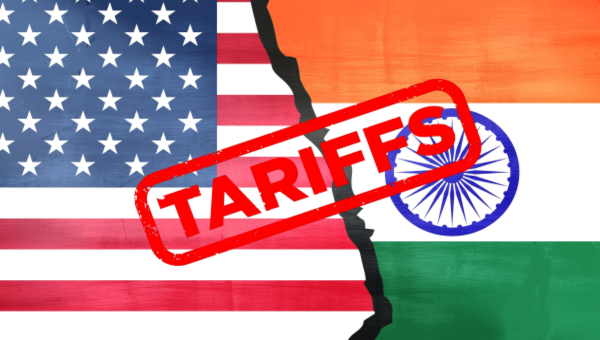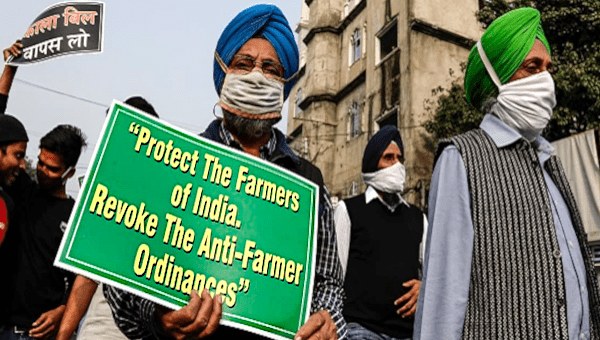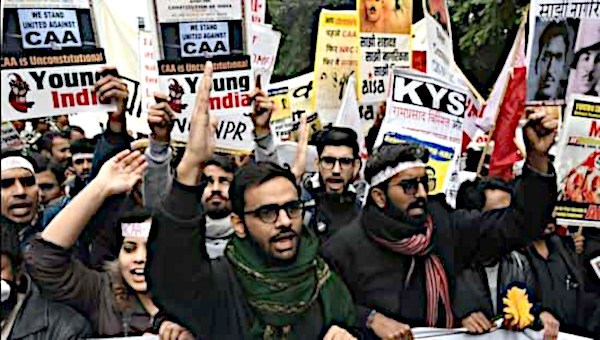Solidarity with Farmers of India
In a full-page ad in the Toronto Star on February 27, labour, community and civil society organizations in Canada and elsewhere expressed their support for India’s farmers. This Declaration of Solidarity comes at a time when thousands of farmers in India have been engaged for months in the largest and longest sustained non-violent resistance movement in Indian and possibly world history, surpassing Mahatma Gandhi’s historic 1930 Dandi March against the abhorrent British colonial Salt Law. The Declaration is part of a growing movement outside India to demonstrate that the world is watching and that we are firmly behind the farmers and their struggle to survive.
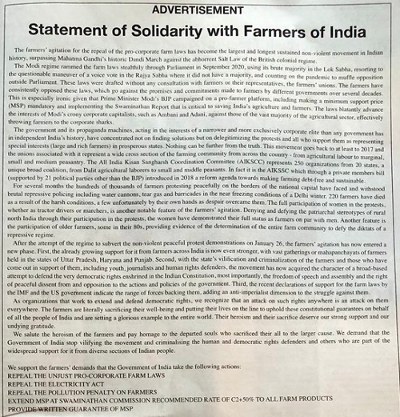 The farmers are protesting farm laws that will destroy the livelihoods of the millions employed in agriculture in India while blatantly advancing the interests of Prime Minister Modi’s corporate cronies. This is a struggle for survival that has brought out farmers and agricultural workers throughout the country, across class and caste lines. For almost four months now, hundreds of thousands have been protesting peacefully in the outdoors, braving the freezing winter and withstanding water cannons, tear gas, and barricades. Over 200 have died. Women from farm families are on the front lines. Even older farmers in their 80s are active participants.
The farmers are protesting farm laws that will destroy the livelihoods of the millions employed in agriculture in India while blatantly advancing the interests of Prime Minister Modi’s corporate cronies. This is a struggle for survival that has brought out farmers and agricultural workers throughout the country, across class and caste lines. For almost four months now, hundreds of thousands have been protesting peacefully in the outdoors, braving the freezing winter and withstanding water cannons, tear gas, and barricades. Over 200 have died. Women from farm families are on the front lines. Even older farmers in their 80s are active participants.
Dubious Process
Prime Minister Modi rammed the farm laws through Parliament in September, through dubious process and without debate, relying on a pliant media and pandemic conditions to muffle opposition outside Parliament. This happened without consultation with farmers’ representatives. When despite continued attempts at repression, the movement only grew stronger, the government launched an all-out effort to vilify and criminalize the farmers, including through arrests. The farmers’ movement has now also become a movement to defend the democratic rights to free speech, assembly, and peaceful dissent enshrined in the Indian Constitution, in resistance to Modi’s increasingly authoritarian regime.
“In these last months, the world has watched tens of thousands of Indian farmers and farm workers leave their fields for the streets to protest the corporate takeover of their livelihoods,” said Hassan Yussuff, President of the Canadian Labour Congress. “Canadian unions support their fight to repeal laws that will impoverish millions of small farmers and leave more farm workers unemployed.”
At this historic moment we stand with Indian farmers in their struggle for survival, for justice, for democracy, for a say in determining and protecting their futures and that of successive generations. The Government of India must repeal the unjust farm laws and meet the farmers’ demands. •
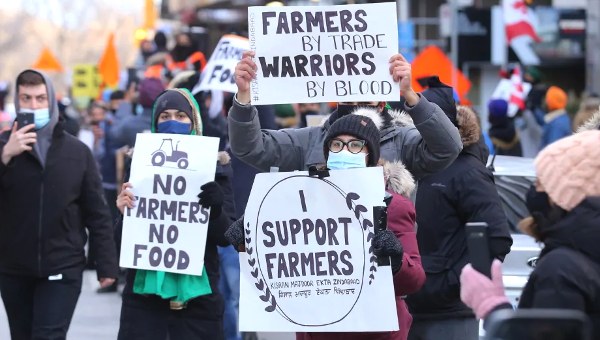
Statement of Solidarity with Farmers of India
The farmers’ agitation for the repeal of the pro-corporate farm laws has become the largest and longest sustained non-violent movement in Indian history, surpassing Mahatma Gandhi’s historic Dandi March against the abhorrent Salt Law of the British colonial regime.
The Modi regime rammed the farm laws stealthily through Parliament in September 2020, using its brute majority in the Lok Sabha, resorting to the questionable maneuver of a voice vote in the Rajya Sabha where it did not have a majority, and counting on the pandemic to muffle opposition outside Parliament. These laws were drafted without any consultation with farmers or their representatives, the farmers’ unions. The farmers have consistently opposed these laws, which go against the promises and commitments made to farmers by different governments over several decades. This is especially ironic given that Prime Minister Modi’s BJP campaigned on a pro-farmer platform, including making a minimum support price (MSP) mandatory and implementing the Swaminathan Report that is critical to saving India’s agriculture and farmers. The laws blatantly advance the interests of Modi’s crony corporate capitalists, such as Ambani and Adani, against those of the vast majority of the agricultural sector, effectively throwing farmers to the corporate sharks.
The government and its propaganda machines, acting in the interests of a narrower and more exclusively corporate elite than any government has in independent India’s history, have concentrated not on finding solutions but on delegitimizing the protests and all who support them as representing special interests (large and rich farmers) in prosperous states. Nothing can be further from the truth. This movement goes back to at least to 2017 and the unions associated with it represent a wide cross section of the farming community from across the country – from agricultural labour to marginal, small and medium peasantry. The All India Kisan Sangharsh Coordination Committee (AIKSCC) represents 250 organizations from 20 states, a unique broad coalition, from Dalit agricultural laborers to small and middle peasants. In fact it is the AIKSSC which through a private members bill (supported by 21 political parties other than the BJP) introduced in 2018 a reform agenda towards making farming debt-free and sustainable.
For several months the hundreds of thousands of farmers protesting peacefully on the borders of the national capital have faced and withstood brutal repressive policing including water cannons, tear gas and barricades in the near freezing conditions of a Delhi winter. 220 farmers have died as a result of the harsh conditions, a few unfortunately by their own hands as despair overcame them. The full participation of women in the protests, whether as tractor drivers or marchers, is another notable feature of the farmers’ agitation. Denying and defying the patriarchal stereotypes of rural north India through their participation in the protests, the women have demonstrated their full status as farmers on par with men. Another feature is the participation of older farmers, some in their 80s, providing evidence of the determination of the entire farm community to defy the diktats of a repressive regime.
After the attempt of the regime to subvert the non-violent peaceful protest demonstrations on January 26, the farmers’ agitation has now entered a new phase. First, the already growing support for it from farmers across India is now even stronger,with vast gatherings or mahapanchayats of farmers held in the states of Uttar Pradesh, Haryana and Punjab. Second, with the state’s vilification and criminalization of the farmers and those who have come out in support of them, including youth, journalists and human rights defenders, the movement has now acquired the character of a broad-based attempt to defend the very democratic rights enshrined in the Indian Constitution, most importantly, the freedom of speech and assembly and the right of peaceful dissent from and opposition to the actions and policies of the government. Third, the recent declarations of support for the farm laws by the IMF and the US government indicate the range of forces backing them, adding an anti-imperialist dimension to the struggle against them.
As organizations that work to extend and defend democratic rights, we recognize that an attack on such rights anywhere is an attack on them everywhere. The farmers are literally sacrificing their well-being and putting their lives on the line to uphold these constitutional guarantees on behalf of all the people of India and are setting a glorious example to the entire world. Their heroism and their sacrifice deserve our strong support and our undying gratitude.
We salute the heroism of the farmers and pay homage to the departed souls who sacrificed their all to the larger cause.We demand that the Government of India stop vilifying the movement and criminalizing the human and democratic rights defenders and others who are part of the widespread support for it from diverse sections of Indian people.
We support the farmers’ demands that the Government of India take the following actions:
- Repeal the unjust pro-corporate farm laws
- Repeal the electricity act
- Repeal the pollution penalty on farmers
- Extend MSP at Swaminathan Commission recommended rate of c2+50% to all farm products
- Provide written guarantee of MSP
Signatories:
- Canadian Labour Congress (CLC)/Congrès du travail du Canada (CTC)
- Alberta Federation of Labour (AFL)
- British Columbia Federation of Labour (BCFL)
- British Columbia Teachers’ Federation (BCTF)
- Canadian Union of Public Employees (CUPE)/Syndicat canadien de la function publique (SCFP)
- Canadian Union of Postal Workers (CUPW)/Syndicat des travailleurs ettravailleuses des postes (STTP)
- Conseil central du Montréal métropolitain–CSN
- Fédération nationale des enseignantes et des enseignants du Québec–CSN
- Hospital Employees’ Union (HEU)
- Manitoba Federation of Labour (MFL)
- National Union of Public and General Employees (NUPGE)
- Ontario Federation of Labour (OFL)
- Saskatchewan Federation of Labour
- Unifor National
- United Steelworkers (USW)/Le Syndicat des Métallos, Canada
- Toronto and York Region Labour Council
- Vancouver & District Labour Council
- Academics and Activists Against Hate, Canada
- Alternatives, Montréal
- Alternatives International
- Ambedkarite Buddhist Association of Texas (ABAT)
- Anti Caste Discrimination Alliance, UK
- Asian Canadian Labour Alliance (ACLA)
- Les Artistes pour la Paix
- Between the Lines Books, Toronto
- Campaign Against Criminalising Communities, UK
- Canadian Foreign Policy Institute
- Canadians Against Oppression and Persecution
- Caring for Social Justice Collective/CollectifSoignonslajusticesociale,Québec
- CareMongering International
- Centre de travailleurs et travailleuses immigrant/es/Immigrant Workers’ Centre(CTI/IWC), Montreal
- Centre for Study and Research in South Asia (CERAS), Montreal
- Collectif-CEDETIM, France
- The Corner House, UK
- Crescent Hub, The
- Community Food Centres Canada/Centres communautaires d’alimentation du Canada
- Dalit Solidarity Forum-USA
- Democracy Equality and Secularism in South Asia, Winnipeg
- Disha, Canada
- East India Defence Committee, Vancouver
- ETC Group, Quebec
- Europe solidaire sans frontières (ESSF), France
- Fédération des femmes du Québec(FFQ)/Québec Women’s Federation
- Femmes de diverses origines/Women of Diverse Origins(FDO-WDO), Montreal
- Fernwood Publishing, Halifax and Winnipeg
- Foundation the London Story Netherlands
- Geopolitical Economy Research Group
- Global Justice Ecology Project
- Good Jobs for All Coalition, Toronto
- Gursharan Singh Memorial Lecture Committee, Vancouver
- Himalaya Seniors of Quebec (HSQ)
- Hindus for Human Rights (HfHR)
- India Civil Watch International (ICWI)
- India Civil Watch-Montrreal
- India Solidarity, Germany
- Indian Resistance Network, Norway
- Indian Scheduled Caste Welfare Association UK
- Indian Workers’ Association GB (COC), UK
- Justice for All
- Justicia for Migrant Workers (J4MW), Canada
- Khanyisa Education and Development Trust, South Africa
- Kurdish People’s Assembly, UK
- The Kurdish Women’s Initiative in the UK
- Makukhanye Rural Movement, South Africa
- Montreal Serai
- Pakistan Organization of Quebec (POQ)
- Pash Memorial International Trust
- Peace in Kurdistan, UK
- People’s Health Movement Canada/Mouvement populaire pour la santé au Canada
- Progressive Cultural Association, Calgary
- Punjabi Cultural Association (PCA) Edmonton
- Punjabi Literary and Cultural Association, Winnipeg
- Qualitative Research Lab-Global South
- Quebec Movement for Peace
- Respecting Elders Communities against Abuse/Ressources Ethnoculturelles Contre l’Abus envers les Aîné(e)s (RECAA), Montreal
- Rete jin Milano and CISDA (Italian Coordination in Support of Afghan Women)
- Ryerson Centre for Studies in FoodSecurity, Toronto
- Sarokaran Di Awaaz, Toronto
- Secular Peoples’ Association, Edmonton
- Shri Guru Ravidas Sabha Derby (UK)
- Sikh Virsa International, Calgary
- SOAS India Society (Schoolof Oriental and African Studies, London, UK)
- The Social Justice Centre, Kwantlen Polytechnic University, B.C.
- Socialist Project, Canada
- Society for Socialist Studies, Canada
- South Asian Dalit and Adivasi Network (SADAN)
- South Asian Women’s Community Centre (SAWCC)/Centre communautaire des femmes sud-asiatiques, Montreal
- Southall Black Sisters, UK
- South Asian Network for Secularism and Democracy (SANSAD)
- South Asian Youth (SAY) Collective/Collectif jeuneusse sud-asiatiques (JSA), Montreal
- South Durban Community Environmental Alliance, South Africa
- Taraksheel Cultural Society of Canada
- Toronto Association for Democracy in China
- Teesri Duniya, Montreal
- Unitarian Church of Montreal/Église unitarienne de Montréal
- Voices Against Fascism in India
- West Coast Coalition Against Racism (WCCAR), Vancouver
- Women Defend Rojava, UK
For complete list, see globenewswire.com.
Déclaration de solidarité avec les agriculteurs indiens
L’agitation des agriculteurs pour l’abrogation des lois agricoles favorables aux entreprises est devenue le mouvement non violent le plus important et le plus ancien de l’histoire de l’Inde, dépassant la marche historique Dandi du Mahatma Gandhi contre l’horrible loi sur le sel du régime colonial britannique.
Le régime Modi a imposé ses lois agricoles de façon furtive en septembre 2020, en utilisant sa majorité absolue au Lok Sabha (la Chambrebasse), et en recourant à la manœuvre discutable d’un vote oral (par acclamation) au Rajya Sabha (la Chambre haute) où il n’a pas de majorité, et en misant sur la pandémie pour étouffer l’opposition à l’extérieur du Parlement.
Ces lois ont été rédigées sans aucune consultation des agriculteurs ou de leurs représentants, les syndicats d’agriculteurs. Les agriculteurs se sont systématiquement opposés à ces lois, qui vont à l’encontre des promesses et des engagements pris envers les euxpar différents gouvernements pendant plusieurs décennies. Cela est particulièrement ironique étant donné que le BJP du Premier ministre Modi a fait campagne sur une plate-forme favorable aux agriculteurs, notamment en rendant obligatoire un prix de soutien minimum (MSP)aux produits agricoles, et en mettant en œuvre le rapport Swaminathan, qui est essentiel pour sauver l’agriculture et les agriculteurs indiens.
Ces lois favorisent de manière flagrante les intérêts des capitalistes et corporatistes copains de Modi, tels que les Ambani et les Adani, contre les intérêts de la grande majorité du secteur agricole, jetant de fait les agriculteurs aux requins des entreprisesde l’agri-business.
Le gouvernement et ses machines de propagande, agissant dans l’intérêt d’une élite plus étroite et plus exclusivement corporative que n’importe quel gouvernement dans l’histoire de l’Inde indépendante, se sont concentrés non pas sur la recherche de solutions, mais sur la délégitimation des oppositionseten accusanttous ceux qui les soutiennentde représenterdes intérêts particuliers (grands et riches fermiers) des États prospères.
Rien n’est plus éloigné de la vérité. Ce mouvement remonte au moins à 2017 et les syndicats qui lui sont associés représentent un large échantillon de la communauté agricole de tout le pays – du travail agricole à la paysannerie marginale, petite et moyenne. Le All India Kisan Sangharsh Coordination Committee (AIKSCC) représente 250 organisations de 20 États, une large coalition unique, des ouvriers agricoles dalits aux petits et moyens paysans. En fait, c’est l’AIKSSC qui, par le biais d’un projet de loi d’initiative parlementaire (soutenu par 21 partis politiques autres que le BJP), a introduit en 2018 un programme de réforme visant à rendre l’agriculture sans detteet durable.
Pendant plusieurs mois, les centaines de milliers d’agriculteurs qui manifestaient pacifiquement aux frontières de la capitale nationale ont fait face et ont résisté à des mesures policières répressives brutales, notamment des canons à eau, des gaz lacrymogènes et des barricades dans les conditions quasi-glaciales de l’hiver à Delhi. 220 agriculteurs sont morts dans cesconditions difficiles, quelques-uns de suicide malheureusement alors que le désespoir les avait vaincus. La pleine participation des femmes aux manifestations, qu’elles soient conductrices de tracteur ou marcheuses, est une autre caractéristique notable de l’agitation des agriculteurs.
Niant et défiant les stéréotypes patriarcaux du nord de l’Inde rurale en participant aux manifestations, les femmes ont démontré leur plein statut d’agriculteurs au même titre que les hommes. Une autre caractéristique est la participation d’agriculteurs plus âgés, certains dans les 80 ans, témoignant de la détermination de l’ensemble de la communauté agricole à défier les diktats d’un régime répressif.
Après la tentative du régime du 26 janvier de renverser les manifestations pacifiques non violentes de protestation, l’agitation des agriculteurs est entrée dans une nouvelle phase.
Premièrement, le soutien déjà croissant auxagriculteurs à travers l’Inde est maintenant plus fortque jamais, avec de vastes rassemblements ou mahapanchayats d’agriculteurs organisés dans les États de l’Uttar Pradesh, de l’Haryana et du Punjab.
Deuxièmement, avec la diffamation et la criminalisation par l’État fédéral des agriculteurs et de tous ceux qui se sont prononcés pour les soutenir, y compris les jeunes, les journalistes et les défenseurs des droits humains, le mouvement a maintenant acquis le caractèred’une vaste tentative de défense des droits démocratiques. consacrés dans la Constitution indienne, surtout la liberté d’expression et de réunion et le droit à la dissidence pacifique et à l’opposition aux actions et politiques du gouvernement.
Troisièmement, les récentes déclarations de soutien aux lois agricoles par le FMI et le gouvernement américain indiquent l’éventail des forces qui les soutiennent, ajoutant une dimension anti-impérialiste à la lutte contre elles.
En tant qu’organisations qui œuvrent pour étendre et défendre les droits démocratiques, nous reconnaissons qu’une attaque contre ces droits n’importe où est une attaque contre ces droits fondamentaux partout. Les agriculteurs sacrifient littéralement leur bien-être et mettent leur vie en danger pour faire respecter ces garanties constitutionnelles au nom de tout le peuple indien et donnent un exemple glorieux au monde entier. Leur héroïsme et leur sacrifice méritent notre ferme soutien et notre gratitude éternelle.
Nous saluons l’héroïsme des fermiers et rendons hommage aux âmes des martyrsqui ont tout sacrifié à plus large la causenationale et humaine.Nous exigeons que le gouvernement indien cesse de calomnier le mouvement et de criminaliser les défenseurs des droits humains et démocratiques et les autres qui font partie du soutien généralisé de diverses sections de la population indienne.
Nous soutenons les demandes des agriculteurs pour que le gouvernement indien prenne les mesures suivantes:
- ABROGATION DES LOIS AGRICOLES PRO-CORPORATE INJUSTES
- ABROGATION DE LA LOI SUR L’ÉLECTRICITÉ
- ABROGATION DE LA PEINE DE POLLUTION POUR LES AGRICULTEURS
- ÉTENDRE LE MSP (Prix minimum de soutien) AU TAUX RECOMMANDÉ DE LA COMMISSION SWAMINATHAN, SOIT C2 + 50% À TOUS LES PRODUITS AGRICOLES
- FOURNIR UNE GARANTIE ÉCRITE DE MSPAUX PRODUCTEURS AGRICOLES


